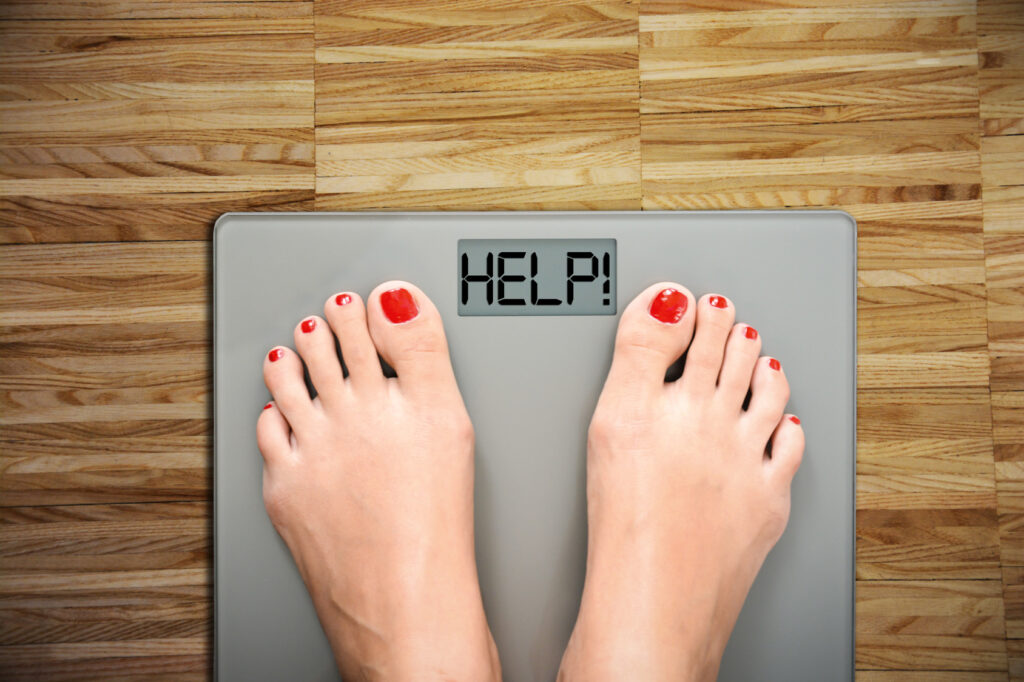When it comes to losing weight, there are a few common mistakes to avoid
For some people, losing weight can be difficult.
Even if you believe you are leading a healthy lifestyle, you may not be obtaining the results you desire.
It’s possible that you’re following erroneous or out-of-date advice. This could prevent you from noticing the changes you want to observe.
Here are some frequent weight-loss mistakes that people make.

Excessive or insufficient calories
Weight loss necessitates a calorie deficit. This implies that you must expend more calories than you consume.
For many years, it was thought that cutting 3,500 calories per week would result in a weight loss of 1 pound (0.45 kg). Recent study, however, suggests that the calorie deficit required varies from person to person.
It’s possible that you’re not getting enough calories because you don’t feel like you’re eating enough. However, research shows that people frequently underestimate the number of calories in a meal.
In one study, adults were instructed to run on a treadmill, estimate how many calories they expended, and then be given a meal with the same number of calories. Participants dramatically underestimated and overestimated calories in exercise and diet, according to the study.
You may be eating things like nuts and fish that are nutritious yet rich in calories. The importance of eating modest portion amounts cannot be overstated.
On the other side, restricting your calorie intake too drastically can backfire. Very low-calorie diets have been shown in studies to cause muscle loss and considerably impede metabolism.
Choosing “diet” or low-fat food
Processed low-fat or “diet” foods are frequently promoted as healthy options for weight loss. They may, however, have the opposite effect.
To increase their taste, many of these goods are laced with sugar. A 6-ounce (170-gram) container of low-fat flavored yogurt, for example, may have 23.5 grams of sugar (over 4 teaspoons).
A 2,000-calorie diet should contain no more than 12 teaspoons of added sugar per day, according to the Centers for Disease Control and Prevention (CDC).
Low-fat foods may make you feel hungrier, causing you to consume more calories than your body requires.
Choose a combination of nutritious, minimally processed foods instead than low-fat or “diet” items. Choose fruits and vegetables, including canned and frozen types, whenever possible because they are naturally low in fat and high in nutrients.
Concentrating exclusively on the scale
Despite leading a healthy lifestyle, it’s common to feel that you’re not losing weight quickly enough.
It’s critical to keep in mind that the number on the scale is simply one indicator of weight loss. Several factors influence weight, including fluid variations and the amount of food left in your system.
In fact, depending on how much food and liquid you’ve ingested, your weight may fluctuate by 2 to 4 pounds over the period of a few days.
In addition, hormonal changes in women can result in increased water retention, which is reflected in the weight on the scale.
If the number on the scale isn’t changing, it’s possible that you’re reducing fat mass but retaining water. You may also be growing muscle and reducing fat if you’ve been exercising.
Even though the number on the scale stays the same, your clothes may start to feel looser — especially around the waist — when this happens.
Even if the scale number doesn’t move much, measuring your waist with a tape measure and taking monthly pictures of yourself can suggest if you’re losing weight.

Exercising too little or too much
You will undoubtedly lose some muscle mass as well as fat during weight loss, though the quantity depends on a variety of factors.
If you don’t exercise at all when calorie-restricting, you’re more likely to lose muscle mass and have a lower metabolic rate.
Exercising, on the other hand, may be beneficial:
- minimize the amount of lean mass you lose
- increase fat loss
- prevent your metabolism from slowing down
The more lean muscle mass you have, the easier it will be to reduce weight and keep it off.
Overexercising, on the other hand, might be problematic.
Excessive exercise, according to studies, is unsustainable in the long run for most people and can contribute to stress. Furthermore, it may have a harmful impact on endocrine hormones, which help regulate body activities.
Exercising excessively to urge your body to burn more calories is neither effective nor healthful.
Lifting weights and performing cardio multiple times per week, on the other hand, can be a long-term approach for maintaining metabolic rate while losing weight.
Not lifting weights
Resistance exercise can help you lose a lot of weight.
Lifting weights has been shown in studies to be one of the most effective ways to grow muscle and increase metabolic rate. It also enhances strength and physical function, and it may aid in the reduction of abdominal fat.
In reality, according to a study of 32 studies involving over 4,700 obese persons, the optimum technique for losing weight appears to be a combination of aerobic activity and weightlifting.
Exercising and underestimating how many calories you burn
Many people believe that physical activity “boosts” their metabolism. While exercise does raise metabolic rate, it may be less than you believe.
According to studies, people who are both moderately overweight and overweight tend to overestimate the number of calories they burn during exercise, typically by a large margin.
People may also exaggerate their amount of physical activity. In one study, 29.1% of individuals claimed to be doing more physical exercise than they actually were.
Exercise is still important for overall health and can aid weight loss. It’s important to know how much activity you’re getting and how many calories you’re burning.

Not getting enough fiber in your diet
Your weight loss efforts, as well as your overall health, may be harmed by a low fiber diet.
According to research, viscous fiber, a type of soluble fiber, reduces appetite by producing a gel that stores water. This gel makes you feel full by moving slowly through your digestive tract.
Fiber of any kind, according to research, may help you lose weight. However, even without a calorie-restricted diet, a review of multiple research indicated that viscous fiber lowered weight and waist circumference.
While further research is needed, fiber appears to interact with gut microorganisms, resulting in the production of hormones that make you feel full.
Not getting enough protein in your diet
If you’re attempting to reduce weight, getting enough protein is critical. Protein has been demonstrated to aid weight loss in a variety of ways.
It’s possible that:
- appetite suppression
- enhance feelings of satiation
- maintain or enhance metabolic rate lower the amount of weight regained
- muscle mass should be preserved with weight loss.
Fiber may also help with digestion and lessen the risk of some chronic diseases.
A review also discovered that higher protein diets with 0.6–0.8 grams of protein per pound (1.2–1.6 g/kg) may help with appetite control and body composition change.
Make sure to include a high-protein food in each of your meals to aid weight loss. Keep in mind that your protein options aren’t restricted to meat and dairy. Beans, lentils, quinoa, and flaxseeds are other excellent and inexpensive alternatives.
Overeating, even if you’re not hungry
The traditional wisdom for many years has been to eat every few hours to avoid hunger and a reduction in metabolism.
This, however, may result in you consuming more calories than your body requires throughout the day. You might never feel entirely satisfied.
According to one study, eating only two to three meals a day can result in less inflammation and a lower risk of weight gain.
The advice to eat breakfast every morning, regardless of appetite, appears to be incorrect as well.
In one study, women who didn’t normally have breakfast were urged to consume it for four weeks before 8:30 a.m. Breakfast eaters ingested more calories per day and gained weight by the conclusion of the research, according to the findings.
The answer to losing weight appears to be eating only when you’re hungry.
You’re not keeping track of what you eat in any way
Eating nutritious foods is beneficial to your health and weight loss. You may, however, be consuming more calories than your body requires.
Furthermore, you could not be getting enough protein, fiber, carbohydrates, or fat to support your weight loss and overall health.
According to studies, keeping note of what you eat might help you receive a more accurate picture of your calorie and nutrient intake while also providing accountability.
People who logged their eating once a day lost 0.63 percent more body weight each month than people who reported their meals once a month, according to one study. Those who kept track of their meals and workouts on a more regular basis dropped more weight.
Most online tracking sites and apps allow you to enter your daily exercise in addition to meals. Keeping track of each of these areas might help you get a better picture of your overall health.

Expectations that are unreasonable
Setting weight-loss and other health-related objectives might help you stay on track.
Unrealistic expectations, on the other hand, are prevalent and can work against you.
According to one study, the vast majority of participants intended to drop more than 10% of their body weight, which the researchers deemed unreasonable. Missing weight reduction targets has been linked to unhappiness and future weight loss issues, according to research.
If you want to lose weight, it’s a good idea to set a realistic target, such as losing 5% or 10% of your body weight per week at a rate of 1 or 2 pounds. This could help you achieve your goal while reducing weight at a healthy rate.
Consuming sugary drinks
To reduce weight, many people eliminate soft drinks and other sugary beverages from their diet. Reducing your intake of sugary beverages is also a good idea in general.
Fruit juice, on the other hand, isn’t always a superior option.
Even 100 percent fruit juice is high in sugar and can cause health problems and obesity, similar to sugar-sweetened beverages.
Unsweetened apple juice, for example, has 35.76 grams of sugar per 12 ounces (372 grams). That’s even more sugar than 12 ounces (258 grams) of cola, which has 23.1 grams.
Furthermore, liquid calories do not appear to stimulate your brain’s appetite centers in the same way that solid meal calories do.
According to research, instead of compensating for the liquid calories by eating less later in the day, you may wind up consuming more calories overall.
Not consuming meals that are made up of only one ingredient
Eating a lot of highly processed meals can be a barrier to weight loss.
Processed foods may be a major contributor in the current high incidence of obesity and other health concerns, according to animal and human research.
This, according to some studies, may be linked to their deleterious impact on gut health and inflammation.
Furthermore, whole foods have a tendency to be self-limiting, which means they are more difficult to overeat. It’s simple, on the other hand, to keep eating processed meals even when you’re not hungry.
Choose whole, single-ingredient foods with minimum processing whenever possible.
Not reading labels
You may ingest unwanted calories and unhealthy components if you overlook or misread label information.
Because many goods are branded with healthy-sounding food claims on the front of the packaging, this is easier than it appears. These may lead to erroneous assumptions about the contents of a particular object.
Look at the ingredients list and nutrition facts label on the back of the container to get the most accurate information about your meal.



















